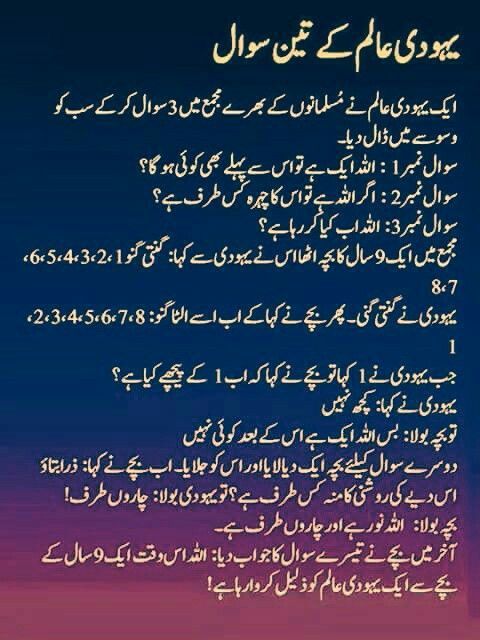But these pagans, nothing would stop them. They still wanted to test whether Muhammad was saying the truth or not. So they are like, look, send a group of people to Medina. There are Jews over there. They have the holy scriptures. Ask them about Muhammad. I mean, if this guy’s really a prophet, these guys should know, because they are familiar with how prophet hood works. They are familiar with divine messages.
So they send a group of people, Makkans to Medina. They meet a group of rabbis and Jewish scholars. They ask the rabbis, we have got a man who’s claiming he is a prophet. How should we treat this? How do we know if he’s a prophet? They tell them, ask him three questions. If he answered correctly, he is a prophet. If he didn’t, kill him, get rid of him. He is lying. What’s the three questions?
The first one: ask him about a group of youth who got lost in a cave. What’s their story? Number two, ask him about a man whom God gave a vast kingdom and power and he would build dams. Who is he? And number three, ask him about the Ruh, the soul. What’s the soul? If he gave you the answer to the first two questions and the third question, he didn’t answer it, he is a prophet. This is written in our scriptures.
They come back happy. We have got a perfect way to discredit the Prophet. We have tough questions. He doesn’t know how to answer. They come to the Prophet. Oh, Muhammad you are truthful? Let’s test you. Tell us about a group of youth who got lost in the cave. Who were they? And who is that man whom God gave power in kingdom and he went from east to west? And what is the Ruh? What is the soul?
The Prophet told them, come tomorrow, I’ll give you the answer. They’re like, okay. The next day, the Prophet is waiting for the Wahy, because he never spoke from himself. He’s waiting for revelation to come. Revelation does not come. No answer. The Prophet has not come with an answer. Two days, three days, four days. Some hadith state 15 days passed by, nothing.
People are anxious. What’s going on? He said, I will have an answer for you. Some of them are like, See? He doesn’t have an answer. Those early Muslims, some of them with a weak heart, they were shaken. What’s going on? This is a messenger of God. Some hadith say this lasted 40 days. At the end of 40 days, Jibra’il came.
Now, how can we look at this? The Prophet, salla Allahu alayhi wa alihi, according to these sources, he asked Jibra’il, Jibra’il, my brother Jibra’il, what happened to you? Where are you? I’ve been waiting for the answer.
He gives him a verse in Surat ul-Kahf: “Wa la taqulanna li shai’in inni fa’ilun dhalika ghadan” (18:23), “illa an yasha’a Allah” (18:24). O Muhammad, when you said, I’ll bring the answer tomorrow, you did not say, in sha Allah, by the will of God, and Allah withdrew me from coming to you.
You have to say, by the will of God, I’ll comment on that. The Prophet tells according to, for example, Ibn Is-haq and his Sirah, he says, the Prophet told Jibra’il, look, I started having bad doubts when you stopped coming. What happened?

This is not acceptable. The Prophet does not have bad doubts. These are weak Hadiths, you know. However, there’s a verse like that, and we do have verses that we do have Hadith that state revelation was delayed. Now why?
Most Muslims believe it’s because the Prophet made a mistake. He did not say in sha Allah by the will of God. So Allah, Subhana wa Ta’ala, wanted to teach him a lesson that everything, whenever you promise something, don’t say it certainly. Say with the permission of God, Allah was teaching him a lesson, and that’s why.
The correct view of our scholars, it wasn’t that the Prophet made a mistake. This was a plan by Allah, Subhana wa Ta’ala, to demonstrate to Muslims and everyone the importance of saying In sha Allah.